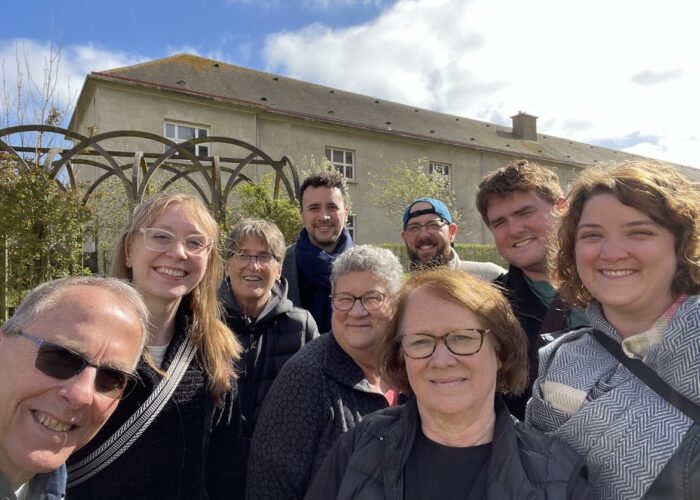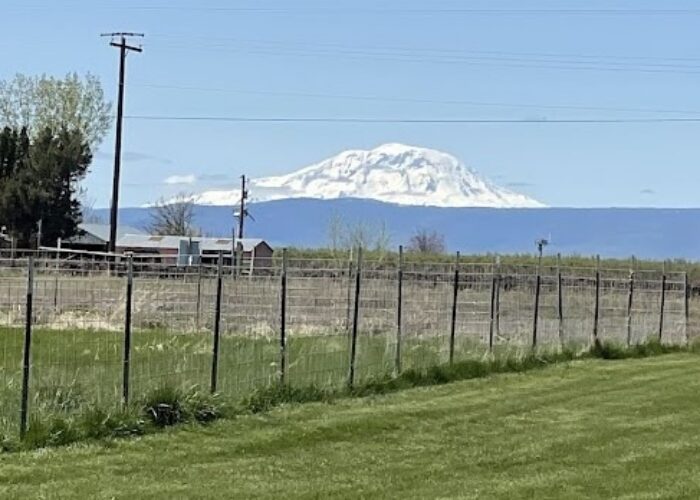Note: The below Q&A invites Mike Sherrill, executive director and CEO of Mennonite Mission Network, to reflect on how the agency’s re-alignment is integrating the peace of Christ and the justice of God’s kingdom throughout the organization and in collaboration with others.
Q: Why did Mennonite Mission Network decide to retire Peace Justice and Support Network (PJSN) as it was?
A: A core value at Mission Network is that people of all cultures experience social, physical and spiritual wholeness through ministries of compassion, peace, and justice. Since 2002 in several venues, PJSN mobilized these values through its various activities. Now, Mission Network desires to integrate this important work with our total approach to peace and justice work. In addition, retiring the PJSN brand name releases those values to radiate through the agency, influencing how we embody the peace of Christ and engage his approach to justice.
Q: What within the re-alignment process made this change necessary and how is this change life-giving?
A: Mission Network is realigning its structure to be more agile and responsive to the changing needs of churches, conferences, and partners. Over several months of listening and sharing sessions within Mission Network, colleagues shared a common concern to develop greater inter-departmental communication and collaboration. Re-alignment gives Mission Network the opportunity to focus our shared vision and organize our structure to be more efficient and effective in pursuing that vision together. An important thread running through the new organizational fabric of Mission Network is to be the peace of Christ internally and externally as we live out what it means to be a mission agency, that people of all cultures are transformed by Jesus Christ. Incorporating the pioneering work of PJSN into the realignment at Mission Network ensures that these essential global Anabaptist values get woven into the fabric of this agency.
Q: Does the retiring of PJSN mean that its focus and activities are no longer priority for Mission Network, or seen as important as its other engagements?
A: Quite the opposite. Mission Network is seeking to expand upon this work to open the doorway to even more collaboration. Discovery happens when we expand our ways of working together. It is natural to have some feelings of loss at the closure of PJSN as a specific initiative. This is an indicator that good things were happening. At the same time, we hold feelings of excitement at the new opportunity before us to collaborate in new ways with churches, conferences, and global partners. For example, Mission Network aims to collaborate with Sue Park-Hur, denominational minister for transformative peacemaking for Mennonite Church USA, to ensure a peace and justice focus remains strong throughout the church. The agency desires that all of us be transformed together as we participate in God’s redemptive mission in the world.
Q: In what ways will Mission Network continue to prioritize peace and justice in its mission? What form/structure will it take?
A: Mission Network desires to embody the values of peace and justice across the organization and will give structure to peace and justice initiatives within the new Division of Ventures. This division represents our total integrated delivery system. Our global partnership, service programs, peace and justice initiatives, discipleship, and church planting will all be housed in this division to facilitate efficient inter-departmental collaboration. In this environment, all peace and justice activities that have been occurring across the street and around the world can be shared with each other. This opens the way for mutual learning and expanding how we engage peace and justice initiatives.
Q: What measures are being put into place to ensure the emphasis on peace and justice will remain strong—and not become too distilled — within Mission Network?
A: The Administrative Council at Mission Network will bring to the table voices from across the organization. This fosters greater mutual awareness and appreciation and ensures that embodying the peace of Christ and the justice of the kingdom is not the focus of just a select few but a shared call. Through a more interlocking structure, we are deepening and broadening its importance. Each team should regularly reflect questions such as: "Are we running our department in ways that embody the peace of Christ? Are we walking the walk through our values in our attitudes, practices, relationships and partnerships?"
It is essential at Mission Network that individuals, departments, and the agency as whole regularly examine not only whether our work is getting done, but how is it getting done; not only what tasks are being accomplished, but how are we relating to each other in that tasking? Reflecting regularly in this way with each other will give us a better chance to effectively embody peace and justice internally and to live it our externally, as well.
Q: Whom shall constituents and friends reach out to when they have questions about how they can partner with Mission Network in the arena of peace and justice?
A: At present, Marisa Smucker, Senior Executive for Ventures, would be the point person to contact with these questions. As we move forward with our realignment, she will be able to direct specific questions to the appropriate person for a response. Maintaining vital communication with our constituency remains a high priority as we seek to equip and empower the church to pursue their unique Kingdom callings.




